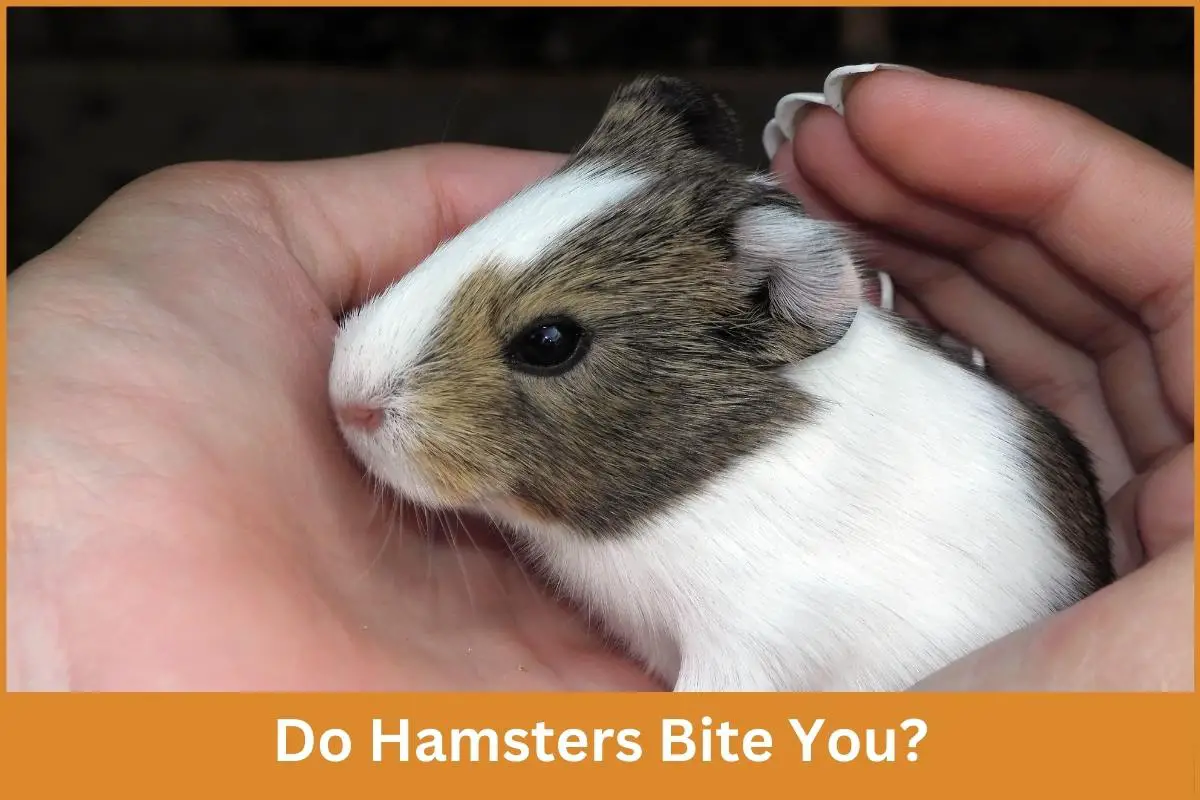As previously mentioned, hamsters can bite if they feel threatened or uncomfortable. It’s a defensive behavior that can be reduced through proper handling and familiarization. Providing a calm and comfortable environment can also help minimize stress and the likelihood of biting.

Key Takeaways
- Hamsters bite when they feel threatened or uncomfortable
- Handling techniques such as gentle and consistent handling can help avoid biting
- Hamsters generally have small teeth and don’t bite hard enough to break the skin, but can draw blood if they feel threatened
- Providing a comfortable environment, avoiding stressors, and gentle handling can help calm a hamster and reduce biting.
What Causes Hamsters to Bite
Your hamster may bite you if they feel threatened or uncomfortable. Biting is a defensive behavior that can happen when a hamster is scared, overwhelmed, or stressed. It’s important to handle your hamster gently and consistently to help reduce the risk of biting. If they become familiar with you, they’ll be less likely to feel the need to bite.
Additionally, providing a calm and comfortable environment can also help minimize stress and the possibility of biting. Be sure to avoid sudden movements or loud noises which can cause your hamster to become startled and possibly bite. Never try to pick up your hamster if they appear agitated or scared.
Taking the time to get to know your hamster and providing them with a secure and peaceful environment can help prevent them from feeling the need to bite.
How to Handle a Hamster to Avoid Biting
When handling your hamster, it’s important to do so gently and consistently to avoid them biting you. Take your time when introducing yourself to your hamster and allow them to get comfortable with you before attempting to pick them up. You should also avoid sudden movements and loud noises, as these can startle them and provoke a defensive bite.
When handling your hamster, make sure to support their entire body and avoid squeezing or pinching them. It’s also important to keep your hands clean and free of any strong scents as these can make your hamster uncomfortable.
When interacting with your hamster, speak to them in a soft and gentle voice while avoiding sudden movements. It’s also important to provide them with an environment that’s both safe and comfortable, free from loud noises and other potential stressors. Doing this will help your hamster learn to trust and feel comfortable around you, which in turn will help to reduce the chances of them biting you.
Can Hamsters Bite Hard Enough to Draw Blood
Can a hamster’s bite draw blood?
It’s possible, though it’s generally unlikely. Hamsters have small teeth and, even when provoked, usually don’t bite hard enough to break the skin. However, if a hamster does feel threatened, it can bite hard enough to draw blood.
This is especially true if the hamster isn’t used to being handled or is in a stressful environment. In such cases, it’s important to handle the hamster gently and familiarize it with its environment to reduce the chances of a bite.
Additionally, it’s important to be aware of signs that the hamster is feeling uncomfortable, such as fur standing on end, to prevent a bite from occurring.
How to Calm a Hamster
You can calm a hamster by providing a comfortable environment. This includes things like setting up a safe, spacious area for them to explore, introducing them to new objects slowly, and avoiding loud noises and sudden movements.
Treats can help make them feel more relaxed and safe, and handling them gently with respect can help them become more comfortable with human contact. Additionally, it can be helpful to create a routine for them, as familiarity and consistency can help reduce stress and anxiety.
How to Treat a Hamster Bite
If you have been bitten by a hamster, it’s important to treat the wound properly. First, wash the wound with mild soap and water to remove any dirt or bacteria. Then, apply an antiseptic to the bite area to help prevent infection. You should also apply a cold compress to reduce swelling and pain. If the bite is severe, seek medical attention immediately.
In addition to treating the bite, it’s important to assess how it happened. Try to figure out what made the hamster feel threatened or uncomfortable. There may be measures you can take to prevent future bites. This could include providing a calm environment and handling the hamster with gentleness and care. With the right approach, you can reduce the likelihood of being bitten again.
Can Hamsters Be Taught Not to Bite
You can teach your hamster not to bite. Proper handling is essential to reduce the likelihood of biting, so it’s important to learn the correct way to pick them up and handle them.
Familiarizing yourself with their behavior and environment can also help reduce their stress and make them feel more comfortable. Make sure to provide a calm and comfortable environment for your hamster, and avoid sudden movements or loud noises that can intimidate them.
Additionally, giving them treats when they’re handled correctly can help reinforce the desired behavior. With patience and consistent training, it’s possible to get your hamster to stop biting.
Are Hamsters Dangerous Pets?
Do hamsters pose a risk to your safety as a pet? It depends.
While hamsters can bite if they feel threatened or uncomfortable, they’re generally gentle and pose little risk. The key is to familiarize yourself with your hamster and provide a calm, comfortable environment.
Proper handling and avoiding overly stressful situations can help your hamster feel at ease. With the right care, hamsters can make great, low-maintenance pets that are well-behaved and unlikely to bite.

